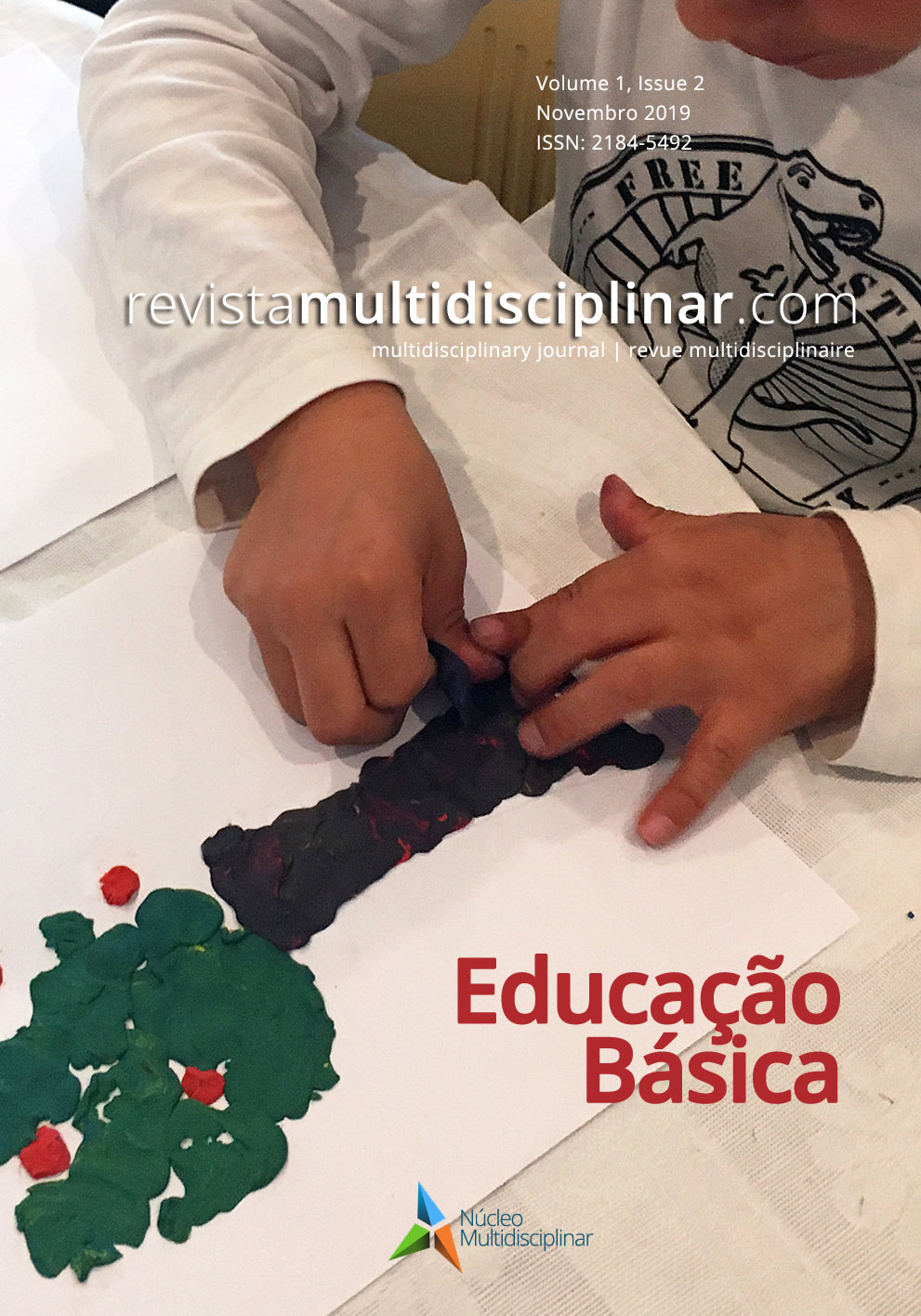Learning difficulties in reading and writing
The perception of primary school teachers in the Algarve region
DOI:
https://doi.org/10.23882/MJ1918Keywords:
reading, school failure, teachersAbstract
Reading and writing are considered basic and crucial tools for school learning. Teachers should be aware of the reading components, language structure, learning disabilities, and effective pedagogical assessment and intervention practices of children at risk of school failure. This study aims to know the perception of teachers of the first grade of the Algarve region about children with reading and writing difficulties. A questionnaire was drawn and sent by e-mail to the teachers and 46 answers were obtained. Only 13% of teachers reported that they have specific training in the area of reading and writing difficulties. It is also referred the 2nd year of schooling as the one with the most percentage of school failure, which teachers associate with reading and writing learning difficulties.
References
American Speech-Language-Hearing Association (ASHA). (2007). Scope of Practice in Speech-Language Pathology. https://www.asha.org/uploadedFiles/SP2016-00343.pdf
Batista, A., Viana, F., & Barbeiro, L. (2011). O Ensino da Escrita: Dimensões gráfica e ortográfica. Ministério da Educação, Direcção-Geral de Inovação e de Desenvolvimento.
Carlisle, J., Correnti, R., Phelps, G., & Zeng, J. (2009). Exploration of the contribution of teachers’ knowledge about reading to their students’ improvement in Reading. Reading and Writing: An Interdisciplinary Journal, 22(4), 459-486.
Carreker, S., Joshi, R. M., & Boulware-Gooden, R. (2010). Spelling-Related Teacher Knowledge: The Impact of Professional Development on Identifying Appropriate Instructional Activities. Learning Disability Quarterly, 33(3), 148-158.
Carvalho, A., Pereira, M., & Festas, I. (2017). Indicadores precoces da dislexia de desenvolvimento: um estudo longitudinal. Revista de Estudios e Investigación en Psicología y Educación, 4(2), 71-88.
Creswell, J. W. (2009). Research Design: Qualitative, Quantitative, and Mixed Methods Approaches. Thousand Oaks, CA: Sage Publications.
Dillman, D. A., Tortora, R. D., & Bowker, D. (1998). Principles for Constructing Web Syrveys. http://www.websm.org/uploadi/editor/Dillman_1998_Principles_for%20Constructing.pdf
Evans, J. R., & Mathur, A. (2005). The value of online surveys, Internet Research, 15(2), 195-219.
Fletcher, J. M., Shaywitz, S. E., Shankweiler, D. P., Katz, L., Liberman, I. Y., Stuebing, K. K., et al. (1994). Cognitive profiles of reading disability: Comparisons of discrepancy and low achievement definitions. Journal of Educational Psychology, 86, 6–23.
Freitas, M., Alves, D., & Costa, T. (2007). O Conhecimento da Língua: Desenvolver a Consciência Fonológica. Ministério da Educação, Direcção-Geral de Inovação e de Desenvolvimento Curricular; Lisboa.
Gillon, G. T. (2004). Phonological awareness: From research to practice. New York: Guilford Press.
Goldim, J. R. (2007). Avaliação ética da investigação científica de novas drogas: a importância da caracterização adequada das fases da pesquisa. Revista HCPA, 27(1), 66-73.
Greenberg, J. (2016). How to build language and literacy through powerful conversations. http://www.hanen.org/Helpful-Info/Articles/How-to-Build-Language-and-Literacy-Through-Powerfu.aspx
IAVE (2017). Instituto de Avaliação Educativa, I.P. Provas de Aferição. http://www.iave.pt/index.php/avaliacao-de-alunos/relatorios/provas-de-afericao
Infoescolas MEC (2017). Estatísticas do Ensino Básico e Secundário. República Portuguesa. http://infoescolas.mec.pt/1Ciclo/#.WuZMg9QvyW8
Justino, D., Pascueiro, L., Franco, L., Santos, R., Almeida, S., & Batista, S. (2014). Atlas da educação: Contextos sociais e locais do sucesso e insucesso: Portugal, 1991-2012. Lisboa: ESCXEL.
Lowry, L. (2014). Promoting Language with Books. The Hanen Centre. http://www.hanen.org/Helpful-Info/Articles/Promoting-Language-with-Books.aspx
Lowry, L. (2016). It’s quality, not just quantity, that helps your child develop language. http://www.hanen.org/Helpful-Info/Articles/Its-Quality-Not-Just-Quantity-That-Helps-Your-C.aspx
Lopes, J., Spear-Swerling, L., Oliveira, C., Velasquez, M., Almeida, L., Araújo, L., Zibulsky, J., & Cheeseman, E. (2014). Ensino da Leitura no 1.º Ciclo do Ensino Básico: Crenças, conhecimentos e formação dos professores. Fundação Francisco Manuel dos Santos.
National Reading Panel (U.S.), & National Institute of Child Health and Human Development (U.S.). (2000). Report of the National Reading Panel: Teaching children to read : an evidence-based assessment of the scientific research literature on reading and its implications for reading instruction : reports of the subgroups. Washington, D.C.: National Institute of Child Health and Human Development, National Institutes of Health.
Nicolielo, A. P., Monteiro, C. Z., Asumpção, M. T., Lopes-Junior, C., Silva, R. H. A., & Sales-Peres, A. (2005). A importância da bioética nas pesquisas em fonoaudiologia. Arq. Ciências Saúde, 12(4), 200-205.
OCDE (2016), PISA 2015 Results (Volume II): Policies and Practices for Successful Schools, PISA, OECD Publishing, Paris. https://doi.org/10.1787/19963777
Pacheco, A. (2012). Caraterização cognitiva de perfis de leitores: o estudo da ortografia portuguesa. Tese de Doutoramento, Universidade do Algarve.
Paul, R. (2007). Language Disorders from infancy through adolescence - assessement & intervention. Third edition. USA: Mosby Elsevier.
Pereira, L. Á. (2001). A formação de professores para o ensino da escrita. Cadernos de Formação de Professores, 2, 35-49.
Ramos, F., Félix, P., & Perdigão, R. (2016). Organização escolar: as turmas. Conselho Nacional de Educação (CNE).
Rodrigues, M., Alçada, I., Calçada, T., & Mata, J. (2017). Apresentação de resultados do Projeto Aprender a Ler e Escrever em Portugal (relatório de progresso).
Silveira, C. S. (2014). A prática docente e os métodos de alfabetização: desafios do ensino da leitura e da escrita para crianças. Universidade Católica do Salvador.
Sim-Sim, I. (2001). A formação de professores para o ensino da leitura. Cadernos de Formação de Professores, 2, 51-64.
Sim-Sim, I. (2009). O Ensino da leitura: A Decifração. Ministério da Educação, Direcção-Geral de Inovação e de Desenvolvimento Curricular. Lisboa.
Spear-Swerling, L., Brucker, P.O., & Alfano, M. P. (2005). Teachers’ literacy-related knowledge and self-perceptions in relation to preparation and experience. Annals of Dyslexia, 55(2), 266-296.
Sucena, A., Castro, S. L., & Seymour, P. (2009). Developmental dyslexia in an orthography of intermediate depth: The case of European Portuguese. Reading and Writing, 22(7), 791-810.
Viana, F. L. (2009). O Ensino da Leitura: Avaliação. Direcção-Geral de Inovação e de Desenvolvimento Curricular. Lisboa.
Walsh, K., Glaser, D., & Dunne-Wilcox, D. (2006). What elementary teachers don’t know about reading and what teacher preparation programs aren’t teaching. Washington, DC: National Council for Teacher Quality.
Downloads
Published
How to Cite
Issue
Section
License
Copyright (c) 2019 Ana Catarina Baptista, Susana Rodrigues, Ana Hilário, Andreia Silva, Verónica Leal

This work is licensed under a Creative Commons Attribution-NonCommercial 4.0 International License.









